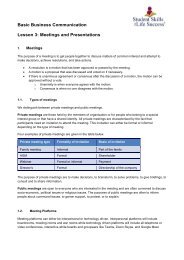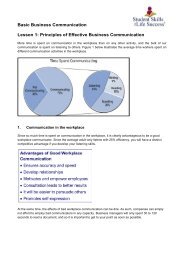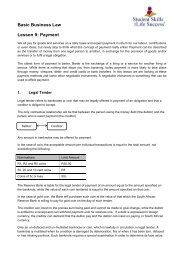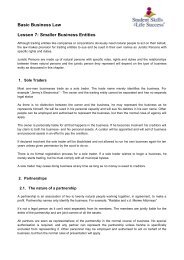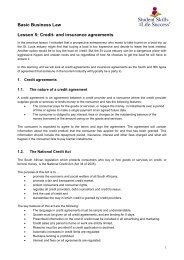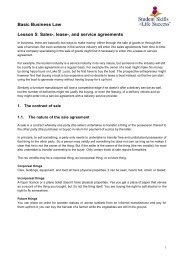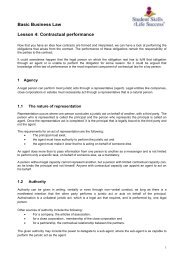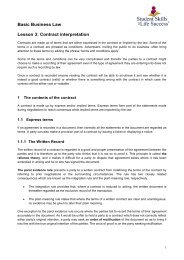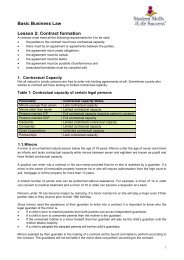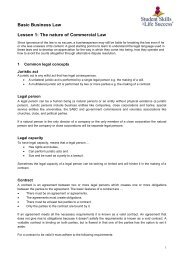Basic Business Law. Lesson 8. Companies
This is the eighth lesson of the "Student Skills for Life Success" "Basic Business Law" course. The topics covered in this booklet are: 1. The nature of a company 2. The Companies Act 3. The Companies and Intellectual Property Commission 4. Types of companies 5. Forming a company 6. Trading as a private company 7. Shareholder meetings 8. Duties and rights of directors 9. Private companies in financial distress
This is the eighth lesson of the "Student Skills for Life Success" "Basic Business Law" course. The topics covered in this booklet are:
1. The nature of a company
2. The Companies Act
3. The Companies and Intellectual Property Commission
4. Types of companies
5. Forming a company
6. Trading as a private company
7. Shareholder meetings
8. Duties and rights of directors
9. Private companies in financial distress
You also want an ePaper? Increase the reach of your titles
YUMPU automatically turns print PDFs into web optimized ePapers that Google loves.
The MoI of a public company permits the company to offer shares to the public but<br />
restricts the director’s right of pre-emption. This means that the directors of a public<br />
company don’t have control over the shares that was issued.<br />
4.2.3. Private companies<br />
Private companies are not state-owned companies and the name of a private company must end with the<br />
words “Proprietary Limited” or its abbreviation [Ply] Ltd. Private companies are subject to fewer disclosure<br />
and transparency requirements than public companies.<br />
The MOI of a private company will prohibit it from offering any of its securities to the public and will restrict<br />
the transferability of its securities. There is no longer a limit on the number of shareholders and the shares of<br />
a private company will only be indicated as a percentage value of the total.<br />
A private company must have at least one director and each incorporator is regarded as a first director of the<br />
company.<br />
4.2.4. Personal Liability <strong>Companies</strong><br />
A personal liability company is a company that meets the criteria for a private company and its MOI states<br />
that it is a personal liability company and that the directors & past directors are jointly and severally liable<br />
together with the company, for the debts & liabilities of the company that were contracted during their<br />
respective terms of office. Its name must end with the word “Incorporated” or its abbreviation “Inc.”.<br />
5. Forming a company<br />
The formation of a company is an action by persons in the exercise of their constitutional right to freedom of<br />
association combined with their common law right to contract. Therefore, the incorporation of a company is a<br />
right, not a privilege granted by the State and so the Act places minimal requirements on the incorporation of<br />
a company.<br />
A company is incorporated by the adoption of a memorandum of Incorporation (MoI). The MoI is the sole<br />
governing document of the company. The Act imposes certain specific requirements on the content of a MoI<br />
which are necessary to protect the interests of shareholders in the company. It further provides a number of<br />
default rules which companies may accept or alter as they wish to meet their needs and serve their interests.<br />
Anyone who wants to incorporate a company can go to a legal practitioner for assistance, but otherwise this<br />
application can be made to CIPC directly on a standard form of MoI which permits the incorporators to<br />
accept the required provisions, as well as the default provisions with or without alteration.<br />
6. The advantages and disadvantages of trading as a private company<br />
The main advantages of a private company over a partnership or sole trader are that the life span of the<br />
private company will be continuous, and the shareholders will have limited liability. Directors could be held<br />
liable though if they knowingly do business in a reckless or fraudulent manner.<br />
Other advantages are that it is easy to transfer ownership and, it is easier to raise capital for a private<br />
company than for a partnership or a sole trader. The business structure also doesn’t have to be adapted if<br />
the business grows really big.







